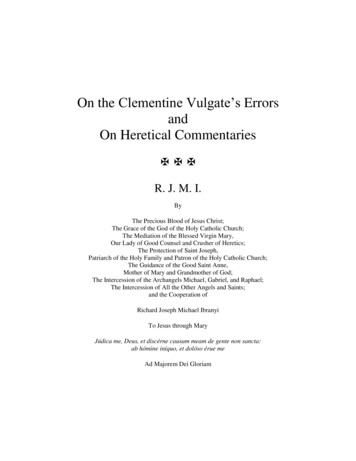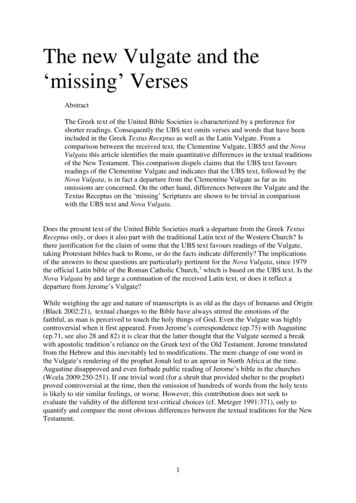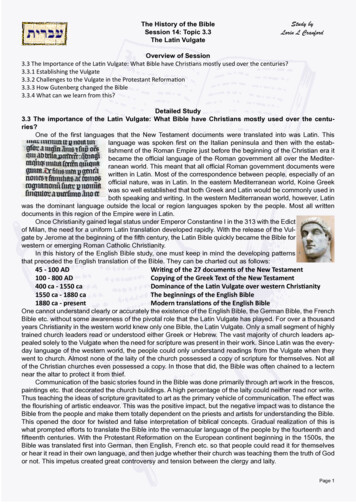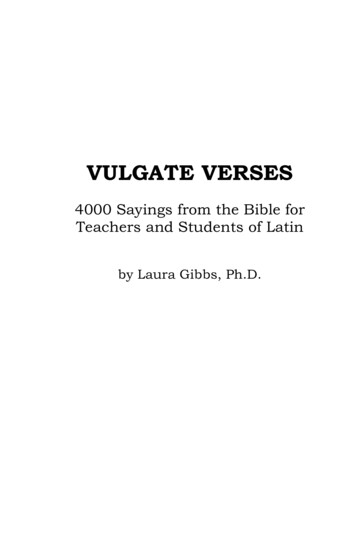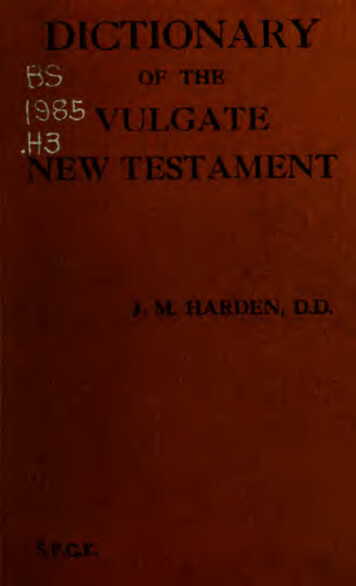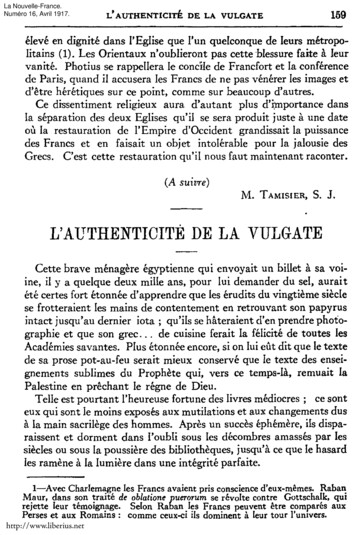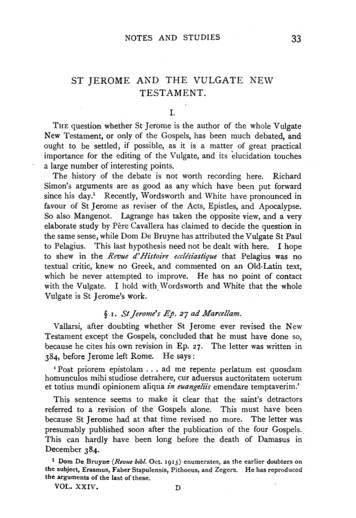
Transcription
NOTES AND STUDIES33ST JEROME AND THE VULGATE NEWTESTAMENT.I.THE question whether St Jerome is the author of the whole VulgateNew Testament, or only of the Gospels, has been much debated, andought to be settled, if possible, as it is a matter of great practicalimportance for the editing of the Vulgate, and its elucidation touchesa large number of interesting points.The history of the debate is not worth recording here. RichardSimon's arguments are as good as any which have been put forwardsince his day. 1 Recently, Wordsworth and White have pronounced infavour of St Jerome as reviser of the Acts, Epistles, and Apocalypse.So also Mangenot. Lagrange has taken the opposite view, and a veryelaborate study by Pere Cavallera has claimed to decide the question inthe same sense, while Dom De Bruyne has attributed the Vulgate St Paulto Pelagius. This last hypothesis need not be dealt with here. I hopeto shew in the Revue d'Histoire eccllsiastique that Pelagius was notextual critic, knew no Greek, and commented on an Old-Latin text,which he never attempted to improve. He has no point of contactwith the Vulgate. I hold with Wordsworth and White that the wholeVulgate is St J erome's work.§ r. St jerome's Ep. 27 ad Marcellam.Vallarsi, after doubting whether St J erome ever revised the NewTestament except the Gospels, concluded that he must have done so,because he cites his own revision in Ep. 27. The letter was written in384, before J erome left Rome.· He says:'Post priorem epistolam . ad me repente perlatum est quosdamhomunculos mihi studiose detrahere, cur aduersus auctoritatem ueterumet totius mundi opinionem aliqua in euangeliis emendare temptaverim.'This sentence seems to make it clear that the saint's detractorsreferred to a revision of the Gospels alone. This must have beenbecause St J erome had at that time revised no more. The letter waspresumably published soon after the publication of the four Gospels .This can hardly have been long before the death of Damasus inDecember 384.1 Dom De Bruyne (Revue bib!. Oct. 1915) enumerates, as the earlier doubters onthe subject, Erasmus, Faber Stapulensis, Pithoeus, and Zegers. He has reproducedthe arguments of the last of these.VOL. XXIV.D
34THE JOURNAL OF THEOLOGICAL STUDIESBut it is the sequel which convinced Vallarsi; and Mangenot haslately urged the same view ; so the rest of the letter must be considered.After a digression in which Jerome assails with his own inimitableinvective the ignorance and the self-indulgent lives of his critics,declaring that they attacked him solely because he had said thata virgin should be more with women than with men (viz. in Ep. 22),he turns upon these bipedes aselli with the citation of three indefensible0. L. readings in St Paul. Why in St Paul? Vallarsi and others,including Mangenot, supposed that St Jerome is concerned to shewhow much better his new revision was than the old. This would havebeen very much off the point, as it was his revision of the Gospelswhich was attacked. The real reason is obvious enough : the threepassages are ingeniously chosen missiles aimed at his tormentors.They merely happened to be in St Paul. Though he had not hadtime to revise the Epistles, having only just finished the Gospels, hisintention of doing so was sufficiently known.I. 'Illi legant : spe gaudentes, tempon· seruientes, nos legamus : spegaudentes, Domino servientes' (Rom. xii r 1 ). This means : 'They aretime-servers and worldly-their reading suits them ; I am a religious,serving the Lord.'12. 'Illi aduersus presbyterum accusationem omnino nonputentrecipiendum, nos legamus : aduersus presbyterum accusationem nereceperis, nisi sub duobus aut tribus testibus.' (r Tim. v 19)-so they haveno right to expect their accusation against me, a Roman presbyter, to bereceived by any one !3· ' Illis placeat : humanus sermo et omni acceptione dignus; nos cumGraecis, id est cum Apostolo, qui Graece est locutus, erremus : fide/issermo et omni acceptione dtgnus.' They may think ' the words of aman' to be worthy of acceptance, the words chosen by some unknowntranslator; for my part I follow the Greek words of the Apostle, 'thewords of faith', fide/is sermo.Very clever, indeed, if not very polite ! The malicious intention ofthe Saint was duly perceived by Pere Lagrange; but by one of theincalculable aberrations to which the most penetrating minds are liable,1 Vallarsi omits non, which is in all the MSS quoted by Hilberg, except one,and is necessary to the sense. Similarly, above, Vallarsi reads: 'caenosos riuulosbibant, et diligentiam, qua auium siluas et concarum gurgites norunt, in Scripturislegendis abiciant,' where Hilberg has restored saliuas for the meaningless siluas:'Let them drink their muddy streams, and when they read the Scriptures castaside the diligence with which they distinguish the flavours of birds and thesquirtings of scent-bottles.' The intention is always the same: 'These sensualand ignorant people dare to attack me, a recluse, an ascetic, and a student, devotedto the study of Scripture, as if I was irreverent to the sacred text, of which theyknow nothing and care less.'
NOTES AND STUDIES35he suggested that St Jerome, for the sake of smiting his adversaries,invented two of the readings which he attributed to them. He doubtswhether humanus ever figured in a Latin text for 1run6 ( !), and whetherany edition could have suppressed nisi sub duobus aut tribus testibus(Revue Biblique, I9I7, p. 447). How invented readings could haveserved St Jerome's purpose he does ·not say.As a fact St J erome chose quite common readings, which were sureto be in the Apostolus of his detractors.I. Tempori seruientes is read by d* g Ambst., with the Greek D F G.The Vg has Domino, of course. Ambst. was told, he says, that theGreek had Deo seruientes, and it is possible that Pelagius read Deo.2. The condition nisi sub duobus aut tribus testibus is omitted byCyprian, Ambst. and Pelagius (as his comment shews).3· In I Tim. iii I D (Greek) has riv0p0mvo ; Myos-, d having humanussermo. Elsewhere this MS has the right reading. Aug. twice quotesI Tim. i IS with humanus, and cites Julian of Eclanum for the samereading. Ambst. has humanus in I Tim. i IS and iii r. Pelagius·seems to have read humanus in I Tim. i Is, 2 Tim. ii I I, and r Tim. iv 9·I do not know whether humanus is ever found in Titus iii 8.But St J erome does not say ego posui, or anything to that effect, withregard to his own reading. He has each time nos legamus, which morenaturally implies that he had not yet published a revision of St Paul.Dom De Bruyne pointed out that he gives ne receperis for no. r,whereas the Vulgate has noli reczpere-another indication that St Jeromeis not defending a revision he had just published.§2.The lackof Prefaces to the New Testament by St Jerome.St J erome's letter to Damasus, Nouum opus, prefixed to the Gospels,begins by stating that the Pope had forced him to discover whichamong the innumerable Latin copies agreed best with the Greek.Further down he says: 'I am now speaking of the New Testament.'Later he adds: 'The present preface promises the four Gospels only.'It is implied that he intended to revise the rest in due time.It is urged that St Jerome never carried out St Damasus's wish andhis own intention. The reason which chiefly moved Vallarsi,t thoughit did not ultimately convince him, was that St J erome wrote noprefaces to the other books of the N. T.r. Westcott replied2 that the omission was probably due to thecomparatively pure state in which the rest of the N. T. was preserved.1He doubts in vol. ii (De vins illustribus 135, note), but in his preface to vol. xhe is certain that St J erome carried out his plan.2 In Smith's Diet. of the Bible, art. 'Vulgate' I 6.DZ
36THE JOURNAL OF THEOLOGICAL STUDIESBut Acts, at least, required and received a pretty thorough castigationat the hands of the Vulgate reviser, whoever he was.2. Though St Jerome did eventually contract an invariable habit ofwriting prefaces to his translations of the 0. T. as he published them,this would scarcely necessitate his prefixing similar letters to a revisionwhich was completed before he contracted the habit. He publishedno preface with the Roman Psalter. If he wrote one to the Gallicanrevision, this was because an explanation was really needed. Therewas no necessity for any preface to the N. T. beyond the Nouum opus,which gave all the explanation that was wanted.3· When St J erome published several books together, he only putone preface for the whole. If they appeared at intervals, each wasprovided with a preface. So there is a preface to each book of mostof his commentaries ; but the Commentary on St Matthew, in fourbooks, has only a single preface. So with his version of the 0. T.:one preface suffices for the Pentateuch, one for the three books ofSolomon,-and so forth.4· A more complete reply is forthcoming. It was in 383 that thePope suggested the revision. The work was a troublesome one, asSt Jerome complained. It is incredible that the Gospels should havebeen completed much b fore the death of Damasus in December 384.It therefore seems highly improbable that the remainder of the N. T.could have appeared during the lifetime of the Pope, who was its 'onliebegetter '. In fact I hope to prove further on that several years passedbefore the whole was given to the world. Now a preface by St Jeromeis always a letter, always a dedication. No one will suppose thatJerome would dedicate his work to Damasus's successor, with whomhe was not on intimate terms, to say the least. He could hardlydedicate to some pious lady the second portion of a work which wasalready dedicated to the protector who had suggested and ordered it.It remained that he should prefix no letter to the concluding part whenit appeared, but let the original epistle serve for the whole, so that allshould be dedicated to his regretted patron.§ 3· The Pauline Text of St Jerome's Commentarz'es.But there is another difficulty against St Jerome's claim to haverevised the whole N. T. In the Vulgate a number of readingswhich he recommends are conspicuous by their absence. It is in thecase of St Paul that this argument is chiefly urged : for Jeromewrote commentaries on Philemon, Gal., Eph., and Titus, and thetext on which he comments is not the Vulgate. Besides this, manyof the variants which he prefers are not in the V ulgate. It was this
NOTES AND STUDIES37difficulty which recently moved Dom De Bruyne to put forwardPelagius as a probable candidate for the revision of St Paul. But thedifficulty is an old one.The most important work on the subject is Corssen's double editionof Galatians, in which he carefully examines the question so far as thatepistle is concerned. His conclusions are quite clear. The text usedin the commentary is not the Vulgate, nor is it precisely an 0. L. text:it is something between the two. It is too near the Vulgate to becounted as an 0. L. text. It represents a revision of the 0. L.according to the Greek.So far is certain, and most important. Corssen went on to concludethat St Jerome did revise the N. T. by Greek MSS, as he professes tohave done, but that this revision is preserved only in the commentaries,the Vulgate being a further revision of St Jerome's revision, made bysome one else. 1It is strange that Corssen's irrefragable conclusions have beenneglected by recent writers, who have pointed to the divergencesbetween St Jerome and the Vulgate, and have concluded that he cannever have revised the Epistles, without adverting to the fact thatCorssen had been obliged by the resemblances to infer the opposite.It has been proved, then, by Corssen that the text of St J erome'scommentaries is a revision which is a stage towards the Vulgate. Butthere is no reason to suppose that this text ever existed in MSSoutside the commentaries.2 It follows that whoever composed theVulgate used St Jerome's text in the commentaries as the basis ofhis revision.Who was this worthy? There is no candidate except St J erome.Corssen tacitly assumed that he could not be the man. Why? Hetwice revised the Psalms, and then made a, new version from theHebrew. Was his revision of four short epistles necessarily final andirreformable ?But the grave difficulty has been raised, that St J erome in hiscommentaries approves and recommends certain readings which donot appear in the Vulgate. In the usual view, that St Jerome's Vulgate1P. Corssen Ep. ad Galatas, Berlin, 1885. Corssen suggested that St Jerome'srevision may still be latent in a few MSS, and in the Ven. Bede. But, on thecontrary, the text of Bede seems to be.of his own making. In Acts he reintroduced0. L. readings out of Codex Laudianus (E), the Greek of which he supposed to bea good text. Some of these appear in the Amiatinus, e. g. Acts vi 10-cf. hiscommentary in loco. In St Paul it is perhaps Pelagius's commentary whichmotived Bede's alterations, e. g. Amiatinus, Eph. i 6, where filio suo is added bythe first hand.2 Though Dom De Bruyne found at Vienna (Bib!. Imp. u63) a twelfth-centuryMS, wherein the text of Ephesians is extracted from St Jerome's commentary.
38THE JOURNAL OF THEOLOGICAL STUDIESof the Epistles was published some years before his commentaries, itmight be replied that these recommendations are a further correctionof the Vulgate. If, on the contrary, the Vulgate is posterior to thecommentaries, as Corssen seems to have shewn, the contradiction ismore striking.The date of the. commentaries is certain enough-about 387.1 I hopeto prove further on (§ r 4) that St Jerome did not issue his revision ofthe whole N. T. until 39r. Thus there will be four years between thetext of the commentaries-which is a stage towards the Vulgate-andthe Vulgate itself. It will be necessary in the sections 5 and 6 toexamine most of the cases where St Jerome recommends readingsin the commentaries.The text given in Vallarsi's edition of the commentaries cannotalways be relied on. Corssen has collated a good number of MSSof the Comm. on Galatians, but they differ a great deal. Yet thegeneral type of text is certain, and the comments help us to determineit. St Jerome continually discusses readings and renderings in hiscomments, and repeatedly informs us what word is used by the Latinusinterpres or Latz'nz' codices or Vulgata editi'o. Sometimes he approves,more often he disapproves. Yet he has frequently retained the readinghe finds fault with. This is often because the reading is a fairly goodone, and his own suggestion is only meant to explain the real force ofthe Greek, and not to serve as a tolerable Latin rendering. In manycases he says that the Greek MSS give a different reading: but even inthis case he sometimes leaves the old version alone.§ 4· St Jerome's Method as a Commentator.It would be a mistake to examine St Jerome's commentaries withoutfirst familiarizing oneself with his very peculiar views as to the duty ofa commentator.He himself explains that in a commentary ' ubi libertas est disserendi '1 The four commentaries on Epistles of St Paul are the earliest works we knowSt Jerome to have published after his arrival at Bethlehem in 386, He tookPhilemon first, then Gal., Eph., Titus, and finished them in great haste in a fewmonths. We can gather the date from the list he gives of his own works inde Viris illu. 135 : for it is certain, from the known dates of some of the writings,that they are enumerated there in strict chronological order. The commentariescome after ad Eustochium (Ep. 22), ad Marcellam epistolarum liber unus (Epp.23-9, 32, 34, 37, 38, 41, 42, perhaps 43, 44), Consolatoria ad Paulam (Ep. 39)·These were all published at the end of 384, or in 38 5 before J erome leftRome in that year. Next are mentioned the commentaries, then Quaestioneshebraicae, De locis, Hebraica nomina. These all appeared in 389, or partiallyin 388. The preface to Galatians shews that the commentaries were written inthe East. They must belong to 387.
NOTES AND STUDIES39(adu. Ruf. i rg), one may cite the contradictory opinions of previouscommentators without naming them! 'Ego enim in commentariisad Ephesios sic Origenem et Didymum et Apollinarium secutus sum,qui certe contraria inter se habent dogmata, ut fidei meae nonamitterem ueritatem' (ibid. i r6). That is to say, he inserts anyheresies of Origen or Apollinarius without warning the reader. Hisown faith is all right all the time; as to the reader's. faith, he does notseem afraid of undermining it : 'Commentatoris officium est multorumsententias ponere' (ibid. i 22 ). 1 So we must not assume that St Jeromebelieves or intends to teach what he sets down in his comments. Norare we in a position even to assume that he approves of the text which headopts or recommends. He may be approving a reading or a renderingbecause it suits the comment he is borrowing from his authority.Consequently it is no matter for surprise if we find him condemninga reading in a commentary, yet regularly quoting it on other occasions.There may not be very many instances of this, but there are certainlysome.He gives us an admirable example of his inconsiste,pcy as regardsthe text, when he admits (in 4'02, adu. Ruf. i 19) that in Psalm ii 12,where the Old Latin has continete disciplinam (Cypr. ter, &c.) orapprehendite disciplinam (Aug., &c.), and his own Roman and Gallicanrevisions both have apprehendite disciplinam, he had given adomtejilium in his Commentarioli in Psalmos, whereas in his translation ofthe Hebrew Psalter he had rendered adorate pure-yet that the Hebrewreally means deosculamini jilium or deosculaminz'.pure. He is positivelyindignant with Rufinus for finding fault with these amazing variations.'Quid igitur peccaui ', he cries, 'si uerbum ambiguum diuersa interpretatione conuerti?' He would have said the same to Richard Simonor Zeghers: 'Why should you expect me to adopt in the Vulgate therenderings which I preferred in the commentary, where, for all youknow, I was speaking with the mouth of the great but dangerousOrigen, or of blind Didymus, my seer, or of my heresiarch teacherApollinarius?' Nay, it is to be feared he might have used strongerlanguage, as he did later in 402, against Pelagius who had dared tocensure the odd doctrines of the Commentary on Ephesians: 'Utnuper indoctus calumniator erupit, qui commentarios meos in EpistolamPauli ad Ephesios reprehendendos putat : nee intelligit, nimia stertensuecordia, leges commentariorum (!} in quibus multae diuersorumponuntur opiniones, uel tacitis ( !) uel expressis eorum nominibus, utlectoris arbitrium sit, quid potissimum eligere debeat, discernere.Quamquam et in prima eiusdem operis libro praefatus sim, me uel1 So ibid. i 16 'Commentarii quid operis habent?Alterius dicta edisserunt, quaeobscure scripta sunt piano sermone manifestant, multorum senfentias replicant.'
40THE JOURNAL OF THEOLOGICAL STUDIESpropria uel aliena dicturum, et ipsos Commentarios tarn ueterumscriptorum esse quam nostros' (Praef. z"n Comm. z"n Jerem.).The Commentary on St Matthew was dictated in a fortnight, andscarcely touches textual questions. Yet its witness is not to be passedover, so far as it goes. Composed in March 398, nearly fourteen yearsafter the revision of the Vulgate Gospels, it has the Vulgate for its text,yet with a large number of differences. The text as given by Vallarsiis not always trustworthy in detaiP But a great many 0. L. readingsare fairly certain, e. g. xix ro uxore where the best Vg. MSS. havemuliere; viii 20 the well-known 0. L. nzaos for tabernacula; ib. 25 addad eum ; ib. 1 8 add discipulos ; xv 1 traditiones ; xxvi 75 jleuit;xviii 26 rogabat, &c. (I have looked up texts at random). In vi r6 ·the text has the 0. L. exterminant, upon which Jerome comments:'Verbum exterminant, quod in ecclesiasticis scripturis uitio interpretumtritum est, aliud multo significat quam uulgo intelligitur. Exterminanturquippe exules qui mittuntur extra terminos. Pro hoc seqnone, demoliuntur semper accipere debemus, quod Graece dicitur acpav{,ov Tt.' Nowin vi 19-20 all, V g. MSS have demoliuntur, and so has the Commentarytext. But in v r6, like the Commentary, the Vg. has exterminant. 2A good example is x 8: Vallarsi's text has mortuos suscitate, but thecomment shews that J erome omitted it, as does the Greek KowiJ; butit is in all Vg. MSS. So the Commentary appears to introduce a newcorrection.In other cases the Commentary agrees with the Vg., as we shouldexpect. On v 22, vi 25, xxiv 36 he mentions additions which he doesnot adopt either in the Commentary or the V g. The same is true ofthe variants he mentions on xi 19 and 23. On the whole the textgiven in the Commentary is nearer the Vg. than is the text of theCommentaries on St Paul. This was to be expected, for the former Isbased on the Vg., whereas the latter represent a stage towards it.§ 5· Cases in the Commentarz"es on St Paul where a critidzed readt"ng zsretained.St J erome in commenting follows the usual method of quoting twoor three verses at a time and then explaining them. The following listgives most of his. textual criticisms which belong to the present point : 1 For example, xiv 1, the text has iusiurandum, but the comment has iuramentum, with the V g. The text gives xxiii q in full, but there is no comment onit, and it is omitted by the Vg.2 W W read demoliuntur, with the Irish MSS and o , a very poor combination(only one Alcuin MS, K, has followed the Irish, so far as I know), for they regardthis as an instance of their principle : 'uera lectio ad finem uictoriam reportat.'But the evidence is weak here, and the witness of the Comm. confirms the bestMSS.
NOTES AND STUDIESr. Gal. i I 6 : ' Siue ut in Graeco melius habet : non contuli cumcarne et sanguine.' The wording shews that he retained the 0. L.acqui'eui' (Aug. Ambst. &c.) in his text. So does the Vulgate.*2. Gal. iv 20: he reads quoniam confundor in uobis, but comments:'Quod quidem Graece magis proprie dicitur. 'A-rropovf:Lat enim non tarnconfusionem . . . quam indigentiam et inopiam sonat. Sensus itaqueiste est : V ellem apud uos nunc adesse, et literarum uocem praesensipse proferre, quia indigeo in uobis.' This is an explanation, not aserious rendering; and in the course of the long comment which followshe adheres to confundor: 'compellitur dicere . quoni'am confundorin uobis,' and again: 'laceror, confundor atque dilanior,' and again:' ita et ego, quia confundor in uobis,' and again : ' nescio enim . quouos debeam sanare medicamine: quia confundor in uobis.' Naturallythis 0. L. reading confundor (d Aug. Ambst. Celestine I) is retained inthe Vulgate also.*3· Gal. v 4 : ' KaTYJpy OTJT cho rov Xpurrov non ut in Latino maleinterpretatum est: Euacuati estis a Christo, sed in Christi opere cessastismagis intelligitur.' St Jerome has doubtless copied this crudely literalexplanation from some commentator or other. He does not mean thewords as a tolerable translation, but as a philological note, and heleaves euacuati (d Amb. Ambst. Bede) in his text. It remains in theVulgate. St Jerome considers it the right of a commentator to pulla word to pieces and discover its etymological force; but as a translatorhe is well aware that St Paul is using an energetic expression 'You areabolished from Christ '; and that, though euacuare is a strange expression here, it is quite comprehensible; while elsewhere in St Paul it isthe correct rendering of Karapy w.4· Gal. v 7 : 'Nemini consenseritis: Sed quia nee in Graecis libris,nee in his qui in Apostolum commentati sunt hoc scriptum inuenimus,praetereundum uidetur.' This comment seems to imply that he hasnot actually ventured to omit the two words in his text. But Corssen'sMSS omit them. They are not in d Aug. Ambst., though they are inLucif. Bede Pel. D H g. I suppose, therefore, St Jerome found theywere not in all Old Latin copies, and hence could dare to omit them inthe Vulgate, where all good MSS leave them out.5· Gal. v 13: 'Tantum ne libertatem in occasionem earn (subauditurdeti's: quod quia in Graeco non habetur, Latinus posuit interpres).'St J erome apprqves, therefore. Of course deti's has to be retained.(0. L. earn detis, Amb. Ambst. &c., Vulgate has more elegantly detiscarni's.) 16. Gal. vi 1 : 'Instruite huiusmodi' in spin"tu mansuetudinis . siue,ut melius habetur in Graeco : peifidati's in spiritu lenitatis.' J eromedoes not change his text, for perficiatis would not be comprehensible.But in the Vulgate, though naturally leaving instruite, he has introducedlenitatis.7. Gal. vi 3 : ' 'Ppeva-rrarij., hoc est, mentem suam decipit: pro quo1 But d omits detis, to agree with the parallel Greek column (D), whereasconversely g and f retain detis in the Latin, and introduce liwTE in their Greekcolumn (G F).
42THE JOURNAL OF THEOLOGICAL STUDIESLatinus posuit interpres, se ipse sedudt.' This is a comment, not asuggested rendering. The Vulgate has ipse se sedudt.8. Eph. i 14: 'Pignus Latinus interpres pro arrabone posuit.' Thisis not a criticism or disapproval. Pignus is retained in the text, and inthe Vulgate.9· Eph. i 14: 'In redemptionem adop#onis, non habet in Graecovio8w·{av, sed 7rEpt7ro{YJcrtv, quam nos acquisitionem siue possessionempossumus dicere, nee tamen uim sermonis expressimus.' But heretains the 0. L. adoptionis here in his text (so d Vigil. 1/J But, asa fact, acquisitionis is the commoner 0. L. reading (Aug. Ambst. Pel. Sed.Bede Vigil. 1ft). So we find acquisi'tioni's in the Vulgate.10. Eph. ii 3: 'Facientes non unam uoluntatem, sed plures: et nonsolum uoluntates carnis, sed etiam mentium, pro quo in Latinis codicibushabetur cogz!ationum.' He has twice quoted the text, the first timewith cogitationum (according to all Vallarsi's MSS), the second timewith mentium. In the Vulgate we find cogitationum. The Greek8tavotwv might be translated either way. But the singular carnis andthe plural 'minds' do not go well together. The A. V. and R. V. havesubstituted the singular 'mind'.n. Eph. iii 10: 'Multiplex quippe sapientia Dei, quae sermoneGraeco 7roAv7ro{KtAo ; et, ut ita dicam, multijaria appellatur.' But heleaves multiplex. In Lib. ii adu. Iouin. 23 he paraphrases 'multiplexet uaria sapientia Dei'. But the more usual 0. L. rendering is a perfectly satisfactory one: multijormis (Amb. Vz'ct. Ambst. Aug. Sed. Bede d),and St Jerome has discovered and adopted it in the Vulgate.12. Eph. iii 13: 'Id quod nunc Latinus translator expressit ne dejiciatis potest iuxta Graeci sermonis ambiguitatem et ita legi ne deficiam. sed magis superior sectandus est sensus.' So he retains deficiatisin his text and in the V ulgate.*13. Eph. iv 19: 'Quod autem ait qui desperantes semetipsos, id est,U7rYJAYYJKOTE ; iavmv , multo aliud in Graeco significat quam in Latino .Exprimamus si possumus uerbum de uerbo, et dicamus a7rYJAYYJKOTE ;indolentes siue indolorios, nam et quidam philosophorum avaAyYJcr{av, idest, indoloriam praedicauit.' Of course these philological explanationsare not meant as serious renderings ! St J erome retains desperantes( Vict. Ambst.), which is really a translation of the Greek variant a7rYJA·1l'LKOTE ;: so the Greek D G with dg, and Iren. Theod. .Mopst. (Iatin) pes h.armen.goth. aethiop. And desperantes remains in Vulg.*14. Eph. v 22: '.Mulieres uiris suz's subditae sint . . hoc quod inLatinis exemplaribus additum est subditae sint, in Graecis codicibus nonhabetur : siquidem ad superiora refertur, et subauditur . . . sed hocmagis in Graeco intelligitur quam in Latino.' That is to say, theaddition was needed, and of course is retained both in the text of thecommentary and in the Vulgate.15. Titus i 4: 'Scribit autem apostolus Tito carissimo filio, quodGraece dicitur yvYJcr{'f T KV!f, et Latino sermone non potest explicari;yv crwo; enim hoc potius sonat quum quis ftdelis et proprius et, ut itadicam, legitimus siue germanus absque comparatione alterius appellatur,'&c. He retains carissinzo in despair of a better. Vulgate hasdilecto.
NOTES AND STUDIES43r6. Titus ii 15: 'Quod uero intulit exhortare, id est, 7rapa.KaAn, aliudquoddam in Graeco significat quam in Latino; 7ra.paK"Arww quippe magisconsolaHonem quam exhortationem sonat,' &c. But he retains exhortarein his text, and in the Vulgate.r 7. Titus iii ro : 'Legitur in Latinis codicibus (quod uerum Papaquoque Athanasius approbabat) : post unam et alteram correptz"onem.' Sohe adopts this reading here and in the Vulgate. As a fact the 0. L. forthe most part omits ·et alteram (post primam Tert.; post unam Iren.Cypr. Lucij. Amb. Aug. Pel. &c.). 1These examples shew us J erome commenting on a fundamentally OldLatin text, of which he approves the readings in five cases (5, 8, 12, 14, q),whereas he is more or less dissatisfied in the twelve other cases (withoutcounting the cases added in the note). But he has apparently made nocorrections. A few of the cases, however, have been altered for thebetter in the Vulgate.I add another passage, not quite paral-lel, but very interesting. OnEph. iii rr, 'quam fecit in Christo Domino nostro ', St Jerome pointsout that in the Greek the relative may have for its antecedent eitherecclesia or sapzentia or 7rp6fi U't' , ' id est propositio, quam nos genereneutrali in Latino sermone propositum habemus expressam '. His textgives propositum (with the 0. L. d Aug. Ambst. ), to which quam cannotrefer. The Vulgate has substituted the feminine wordpraefinitionem, sothat the relative can refer to it. The improvement, therefore, suggestsJ erome's hand.Thus St J erome appears to be extremely cautious in textual corrections,although his passing citations are so free.1 In order to be more or less complete, I will give some further instances ofreadings suggested as alternatives by St J erome, but not adopted. a. On Gal. iv 28uos . jill'i sumus, he explains how Origen's reading uos . filii estis can beunderstood. {:3. On Gal. v 24 he remarks that, for his own carnem crucifixeruut,Origen read Christi carnem cruc., whereas the Vulgata editio read carnem suamcruc.
ST JEROME AND THE VULGATE NEW TESTAMENT. I. 33 THE question whether St Jerome is the author of the whole Vulgate New Testament, or only of the Gospels, has been much debated, and ought to be settled, if possible, as it is a matter of great practical importance for the editing of the
